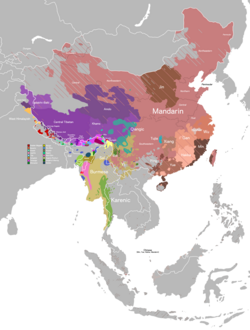Sanxiang dialect
| Sanxiang | |
|---|---|
| 三鄉話 | |
| Sahiu | |
| Native to | China |
| Region | Mainly in Sanxiang, southern Guangdong province. |
Early forms | |
| Chinese characters | |
| Language codes | |
| ISO 639-3 | None (mis) |
| Glottolog | sanx1234 |
 Sanxiang dialect, at the southern periphery of Zhongshan City | |
Sanxiang (in Cantonese Samheung, in the language itself Sahiu) is a Min variety of Southern Min[4][5][6] Chinese mostly spoken in Sanxiang in Zhongshan in the Pearl River Delta of Guangdong, China.[7][failed verification] Despite its close proximity, Sanxiang is not very closely related to the surrounding dialects in the region, which belong to the Yue group, and thus forms a "dialect island" of Min speakers. It is one of three enclaves of Min in Zhongshan, the others being Longdu and Nanlang.[4][5]
Notes
[edit]References
[edit]- ^ Mei, Tsu-lin (1970), "Tones and prosody in Middle Chinese and the origin of the rising tone", Harvard Journal of Asiatic Studies, 30: 86–110, doi:10.2307/2718766, JSTOR 2718766
- ^ Pulleyblank, Edwin G. (1984), Middle Chinese: A study in Historical Phonology, Vancouver: University of British Columbia Press, p. 3, ISBN 978-0-7748-0192-8
- ^ Hammarström, Harald; Forkel, Robert; Haspelmath, Martin; Bank, Sebastian (2023-07-10). "Glottolog 4.8 - Min". Glottolog. Leipzig: Max Planck Institute for Evolutionary Anthropology. doi:10.5281/zenodo.7398962. Archived from the original on 2023-10-13. Retrieved 2023-10-13.
- ^ a b Bodman, Nicholas C. (1982). "The Namlong Dialect, a Northern Min Outlier in Zhongshan Xian and the Influence of Cantonese on its Lexicon and Phonology" (PDF). Tsing Hua Journal of Chinese Studies. 14 (1): 1–19. Archived from the original (PDF) on 2020-02-03.
- ^ a b Bodman, Nicholas C. (1985). "The Reflexes of Initial Nasals in Proto-Southern Min-Hingua". In Acson, Veneeta; Leed, Richard L. (eds.). For Gordon H. Fairbanks. Oceanic Linguistics Special Publications. Vol. 20. University of Hawaii Press. pp. 5–6. ISBN 978-0-8248-0992-8. JSTOR 20006706.
- ^ "Reclassifying ISO 639-3 [nan]: An Empirical Approach to Mutual Intelligibility and Ethnolinguistic Distinctions" (PDF). Archived from the original (PDF) on 2021-09-19.
- ^ Campbell, James. "Zhongshan Sanxiang Dialect Phonology". Glossika. Archived from the original on 2009-04-29. Retrieved 2009-03-25.


 French
French Deutsch
Deutsch

